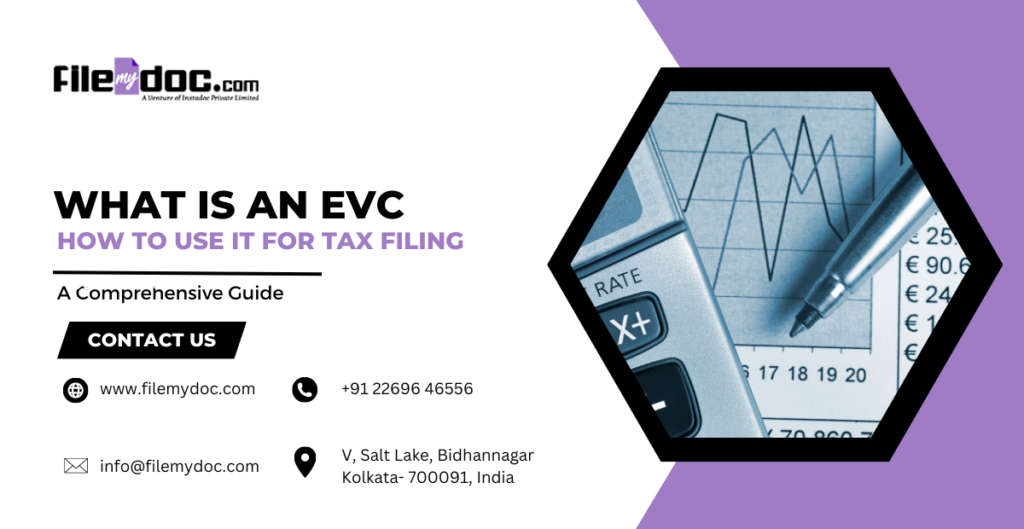What is an Electronic Verification Code (EVC) and How to Use it for Tax Filing: A Comprehensive Guide
As a taxpayer, you may have heard of the term “Electronic Verification Code (EVC)” when filing your income tax return. An EVC is a unique code issued by the Income Tax Department of India to verify the authenticity of an individual’s tax return. In this article, we will discuss what an EVC is, its importance, and how to use it for tax filing.




What is an Electronic Verification Code (EVC)?
An Electronic Verification Code (EVC) is a 10-digit alphanumeric code that is used to verify the authenticity of an individual’s income tax return. The code is generated by the Income Tax Department and is sent to the taxpayer’s registered mobile number or email address. The EVC can be used to electronically verify an income tax return instead of manually signing and submitting a physical copy.
Why is an Electronic Verification Code (EVC) Important?
An EVC is an important tool in the income tax filing process, as it ensures the authenticity of the tax return. It also reduces the need for manual signatures and physical documents, making the filing process faster and more efficient. Additionally, EVCs are valid for a limited period of time, which helps prevent fraudulent use of the code.
How to Generate an Electronic Verification Code (EVC)?
There are several ways to generate an Electronic Verification Code (EVC). The most common methods include:
- Net Banking: Taxpayers who have activated net banking with their bank can generate an EVC by logging into their bank’s website and selecting the option to generate an EVC for income tax filing.
- Aadhaar OTP: Individuals can generate an EVC using their Aadhaar card details by selecting the Aadhaar OTP option on the Income Tax Department’s website. An OTP will be sent to the taxpayer’s registered mobile number, which can then be used to generate the EVC.
- Demat Account: Individuals who have a Demat account can also generate an EVC by logging into their Demat account and selecting the option to generate an EVC for income tax filing.
- Bank ATM: Taxpayers can also generate an EVC by visiting their bank’s ATM and selecting the option for income tax filing. The EVC will be sent to the taxpayer’s registered mobile number.
- Income Tax Department Website: Individuals can generate an EVC by logging into the Income Tax Department’s website and selecting the option to generate an EVC. The code will be sent to the taxpayer’s registered mobile number or email address.
How to Use an Electronic Verification Code (EVC) for Tax Filing?
Once an individual has generated an EVC, they can use it to electronically verify their income tax return. To do so, follow these steps:
- Log into the Income Tax Department’s e-filing portal.
- Select the option to file an income tax return.
- Fill out the required information and calculate the tax due.
- Select the option to verify the tax return using an EVC.
- Enter the 10-digit EVC and submit the tax return.
Conclusion
Electronic Verification Codes (EVCs) are an important tool in the income tax filing process in India. They ensure the authenticity of tax returns and make the filing process faster and more efficient. Taxpayers can generate an EVC using several methods, including net banking, Aadhaar OTP, a Demat account, a bank ATM, and the Income Tax Department’s website. Using an EVC to verify tax returns is easy and can be done in just a few steps.
FAQ’s
Sure, here are some frequently asked questions (FAQs) related to Electronic Verification Codes (EVCs):
Q.1 Is an EVC mandatory for filing income tax returns?
Yes, an EVC is mandatory for electronically filing income tax returns in India.
Q.2 Can an EVC be generated by someone else on behalf of the taxpayer?
No, an EVC can only be generated by the taxpayer themselves. Sharing an EVC with someone else is a violation of the Income Tax Department’s rules.
Q.3 How long is an EVC valid?
An EVC is valid for 72 hours from the time it is generated.
Q.4 What should I do if I don’t receive an EVC after generating it?
If you don’t receive an EVC after generating it, you can try generating it again using a different method. If the issue persists, you can contact the Income Tax Department’s helpline for assistance.
Q.5 Can I use the same EVC for multiple income tax returns?
No, each income tax return requires a unique EVC.
Q.6 What should I do if I accidentally enter the wrong EVC while verifying my tax return?
If you accidentally enter the wrong EVC while verifying your tax return, you will be given three attempts to enter the correct code. If you fail to enter the correct code within three attempts, you will need to generate a new EVC and start the verification process again.
Q.7 Can I use an EVC to file income tax returns for multiple years?
Yes, an EVC can be used to file income tax returns for multiple years, as long as the code is generated within a valid period of 72 hours.
Q.8 Is there any fee for generating an EVC?
No, there is no fee for generating an EVC.
























